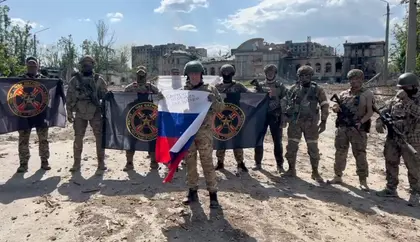In December 2022, the Wagner Group acknowledged its dependence on the state. The mercenaries forced Russia’s Defense Minister Sergei Shoigu and Army Chief of Staff Valery Gerasimov to give them more ammunition to destroy the Ukrainian city of Bakhmut. Any remaining doubts that this ostensibly private military company was in reality a state-sponsored terrorist organization were later dispelled by Russian President Vladimir Putin himself.
 Source: 1: Screenshot Prigozhin's video message and internet-source
Source: 1: Screenshot Prigozhin's video message and internet-source
JOIN US ON TELEGRAM
Follow our coverage of the war on the @Kyivpost_official.
In June 2023, the Wagner Group’s march on Moscow was stopped at the last moment by the promise of amnesty. Since many of his subjects sympathized with the Wagnerites, the Putin tried to debunk the image of land pirates – independent and daring. In remarks on June 27, Putin himself acknowledged that only for the year from May 2022 to May 2023, 86 billion rubles were allocated from the budget for the salaries of Wagner Group fighters, and another 110 billion for payments to the wounded and the families of the dead. In total, this is about $2 billion, excluding the cost of weapons and ammunition issued from army arsenals.
 Source: https://rusreality.info/putin-priznalsja-v-finansirovanii-chvk-vagnera-iz-rossijskogo-bjudzheta/
Source: https://rusreality.info/putin-priznalsja-v-finansirovanii-chvk-vagnera-iz-rossijskogo-bjudzheta/
In a dictatorial state, politicians are not required to be consistent. A few days later, Putin declared that the Wagner Group did not legally exist because there was no law on private military companies in Russia. How then were budgetary funds allocated to a non-existent organization? This question should be asked by lawyers of Western corporations that continue to work in Russia.

KADORR Group Founder Adnan Kivan Passes Away
On Jan. 26, 2023, the US Treasury declared the Wagner Group a transnational criminal organization for massive crimes against Africans. Lithuania recognized it as a terrorist organization in March, and France in May. In July, the Parliamentary Assembly of the Organization for Security and Cooperation in Europe (OSCE) called on the EU and all participating countries to put the “Wagnerites” on their own lists of terrorist groups. Even this didn’t prompt a number of global brands to exit the Russian market.
According to the KSE (Kyiv School of Economics) Institute’s Leave Russia website, the largest of them in 2022 contributed more than 1 trillion rubles ($11 billion) in taxes to the coffers from which the crimes of the Wagner Group are financed.
Philip Morris paid 424.9 billion rubles to the Russian budget. Japan Tobacco International with 319.9 billion rubles in taxes. PepsiCo, Raiffeisen, Nestle, Mars, Leroy Merlin, Metro, and Auchan paid taxes to the Russian budget that totaled about 270 billion rubles.
The released financial data have cast these companies into the controversial role of potentially supporting hostilities. Although these companies do not directly finance military operations, they provide support to a state that openly backs terrorism.
It is understood that companies like Metro and Coca-Cola do not purposefully fund the deaths of Ukrainian children or contribute budgets to individuals like Prigozhin, who carry out brutal acts. However, ignoring the potential consequences of their financial verges on complicity. And this act of turning a blind eye to evil demands recognition.
Perhaps Ukraine’s National Agency for the Prevention of Corruption (NAPC) has appropriately categorized such companies by including them in the Registry of War Sponsors. Yet for some reason, the list does not include the major contributors to Russia’s budget, such as JTI, PepsiCo, and Mars.
In previous columns, I have described how the issue of damages is being raised at the global level by businesses sponsoring Russia’s war against Ukraine. The budget content of the Wagner Group raises the stakes higher – terrorist financing should be unconditionally punished.
As Friedrich Nietzsche warned, “When you stare into the abyss, the abyss stares back into you.” It is time for these businesses to stop turning a blind eye to the potential consequences of their financial contributions. The moment calls for bold action and unwavering commitment to creating a safer, more just, and morally responsible business environment. Only through decisive and principled measures can global businesses in Russia redeem themselves and pave the way for a future free from the shadows of the abyss.
The views expressed in this opinion article are the author’s and not necessarily those of Kyiv Post.
You can also highlight the text and press Ctrl + Enter






